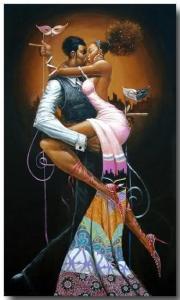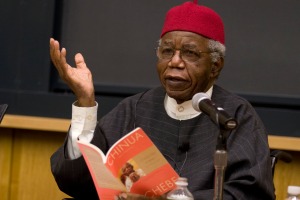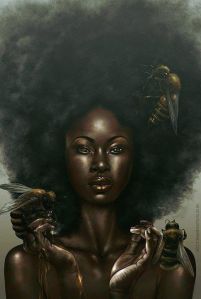
Two weeks ago, I sat down for a transatlantic Skype interview with Alice* who got in touch with us to share her personal experience of an abusive relationship. Being South African herself, the recent headlines on the violence in her home country prompted her introspection and she felt she had an important message for other African women. This is her story:
EAW: Thank you for getting in touch with us to share your story Alice, it was very brave of you.
Not at all, it’s something I’ve always wanted to do but I’ve never known how to do it anonymously because I’m not proud of it.
EAW: I was struck by the fact you said an abusive relationship doesn’t happen to people like you, what did you mean?
I was brought up in a normal family in South Africa, went to a good school and had some strong female role models in my life. I consider myself smart, street wise and independent and in my mind I didn’t fit the profile of the sort of woman to be in an abusive relationship. I’m still trying to work out how it happened and why I put up with it for so long.
EAW: Tell me about the first time it happened.
I’d just come out of a relationship with yet another player when I met Tom. He was the sweetest, most attentive man I’d ever met. He was so romantic and unlike the other guys I’d dated he wanted to spend all his time with me and I very quickly became his whole world. On hindsight that should have been a warning sign.
The first time he hit me was in public, at a party with lots of people around. We’d gone out with a group of friends and as the evening progressed he became more and more moody and standoffish. I was talking and dancing with a couple of my girlfriends when he suddenly marched over, pulled me and said we were going. I told him I wasn’t ready to go when he slapped me in the face and pulled me out of the party. I was shocked and didn’t know what to do, it was in public. I screamed but nobody came to help. He bundled me into a taxi, I was screaming and the taxi driver did nothing. When we got to his place I was still crying and trying to get away, the security guard at his building just looked at me and did nothing.
When we got upstairs he suddenly burst into tears and started apologising and telling me how much he loved me. I remember feeling this deep shame; I was humiliated and couldn’t believe this was happening to me. I think I just wanted to put it behind me and forget it ever happened.
The next morning one of my friends came to his place to check up on me. I took the opportunity to walk down with her and ran off to my aunt’s house nearby. My aunt was furious when I told her what had happened. She’d been in an abusive marriage which had left her with permanent injuries. She took me down to the local police station and insisted I make a report against Tom, which I did.
The next day the police asked me to drop by and told me they had called him into the police station and how remorseful he was. They said they dealt with lots of domestic cases and they’d never seen such a remorseful guy. He’d cried and apologised and assured them it wouldn’t happen again. Suddenly he was this angel and even the police were asking me to give him a second chance.
EAW: So did it end there? Was that the last time he hit you?
Of course not, if anything it became more frequent after that. Each time he hit me he’d break down and apologise and tell me I was his life and he couldn’t live without me. I stayed so I must have felt flattered by this sick love.
My dad had recently died and I guess I was feeling vulnerable and enjoying the attention to the point I was willing to overlook the abuse. He also had a way of turning my friends and family against me so that I would always end up as the bad guy and he was this wonderful man who loved me to bits. The more isolated I became the more the beatings escalated and almost always in public.
He was extremely jealous and possessive and didn’t want me paying attention to anyone else. The funny thing is it was never about me talking to other men; he was jealous of my female friendships and just didn’t want to see me happy or having friendships or a life outside him.
EAW: You went ahead and accepted his marriage proposal despite the beatings?
Foolishly yes, he’d been asking me to marry him from the word go and I finally agreed. I’m just glad I refused to have his baby, something he’d been begging me to do for ages. I look back now and think the day he paid Lobola for me was the day I became a child in the relationship and all the gloves came off, excuse the pun. My family loved him and thought he was the best thing since sliced bread. My auntie warned me that abusive men never change but I went ahead anyway. Perhaps I wanted to be married more than I hated being beaten up.
EAW: So how did you finally leave him?
The last time he hit me he started choking me and that was the final straw. It had always been slapping before but this time he was choking me and tearing off my clothes. This time I fought back, I thought he was going to kill me. I told him I was leaving him and he choked me some more. I managed to bite his hand hard and ran out of the house. I called the police from the street but they didn’t turn up. He ran down after me crying and apologising but I knew I was done. I stopped a taxi and went to my aunt’s house. She was furious and yelled at me to wake up because the man would end up killing me.
EAW: What did Tom do when you moved in with your aunt?
He called my uncle, who had handled the Lobola, as usual trying to make me look like the bad guy. My uncle phoned me begging me to go back to him, that all marriages had their problems and I was embarrassing the family. Tom was very good at spotting the weak links in my family and working on them to put pressure on me. I felt trapped and was getting a lot of pressure from my family to go back to him.
I’d been thinking of leaving the country for a while and then one day I came home and my aunt handed me a bundle of money and said I should go and buy an air ticket and leave the country. She could see the pressure I was under from everyone and felt I wasn’t going to hold out much longer, she was probably right.
So while Tom and my family were calling me begging me to go back to him, I quietly bought an air ticket and slipped out of the country. The next time I spoke to him I was in the UK and he was shocked. He begged me to let him join me and promised he would change but I was through making excuses for him. It’s taken me two years to get my life back together and regain my self esteem but I’ve not looked back.
EAW: You’re very calm and matter of fact about your experience, what did you take out of it?
The biggest learning for me was that the first time someone lays a hand on you walk away, they’ll never stop. It sounds like a cliché but it’s so true. There’s a reason a man lifts his hand to a woman and it has nothing to do with you. Tom obviously had psychological issues that had nothing to do with me, I took those problems and made them mine and lost my own self esteem in the process.
I’ve also learnt to make my own decisions and not involve my family too much, especially my uncles and extended family. Everyone has their own agendas and they are not necessarily aligned to yours. I found out later that Tom had been buying my uncle stuff so no wonder he was on his side. Next time I’ll take the time to get to know and love the man on my own without introducing him to my family. Once Tom had a relationship with my extended family it was easy for him to manipulate them and isolate me. My family are also quite traditional and probably felt that it wasn’t a big deal that he was beating me because all African women are beaten.
I think ultimately we are responsible for our own well being and I should have acted sooner.
EAW: Alice thank you again for taking the time to talk to us and we wish you all the best with your future.
It was a pleasure.
*name has been changed to protect her identity
Tags: african culture, African woman, Culture, Domestic violence, Female Empowerment, feminism, gender based violence, marriage, violence, women's rights












Comments